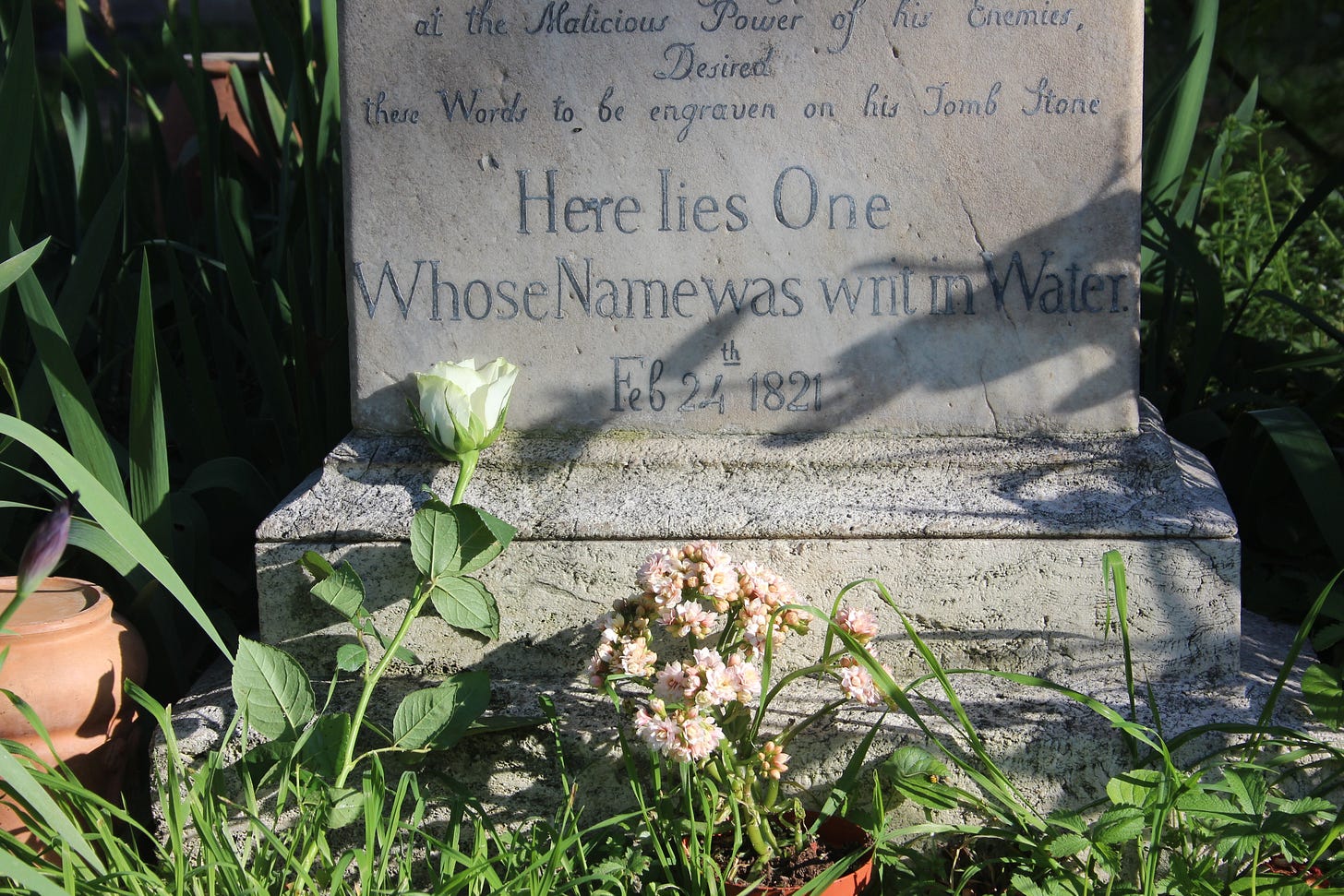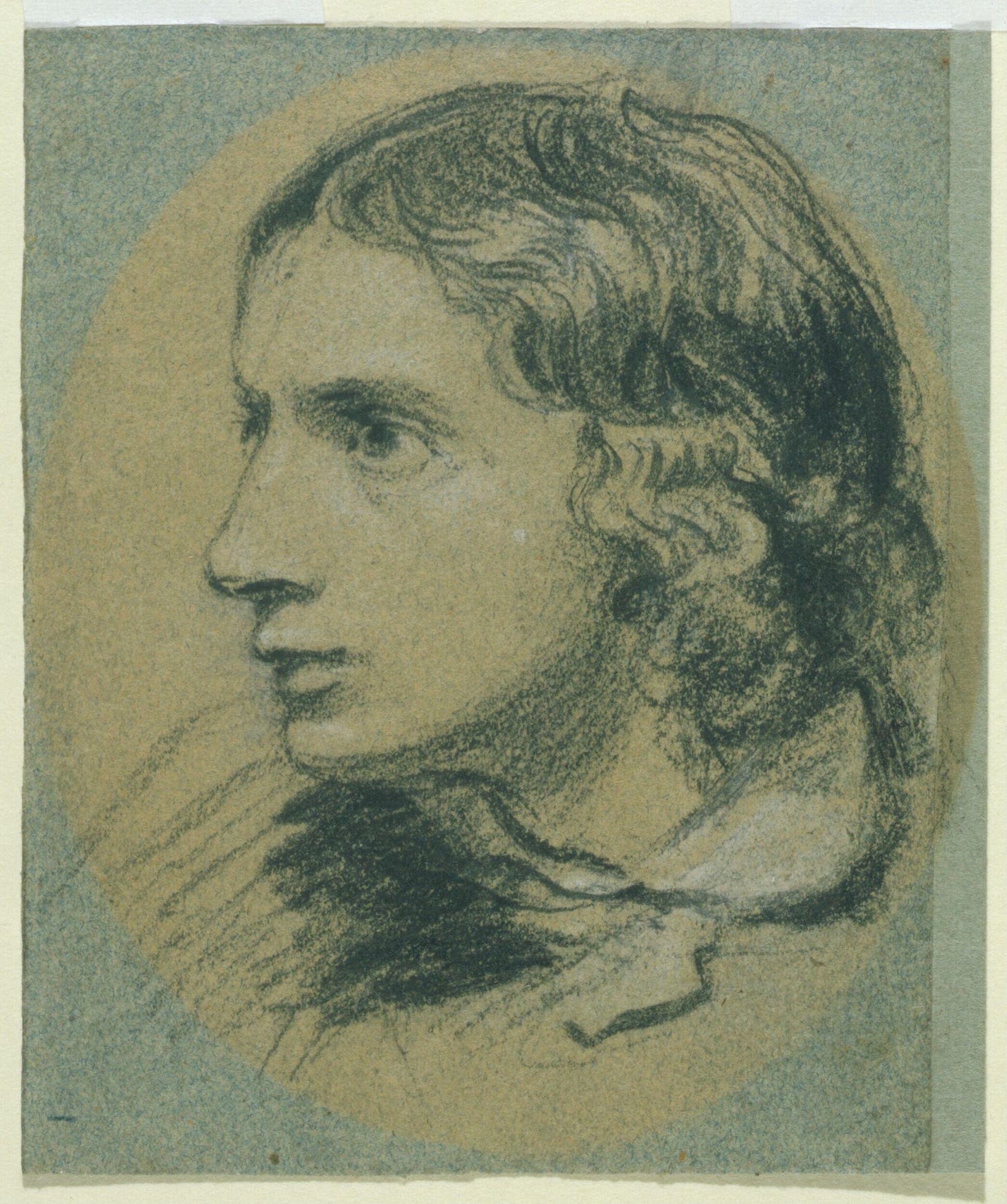A dreaded sunny day,
So let's go where we're happy
And I'll meet you at the cemetery gates
Keats and Yeats are on your side
But you lose, ‘cos Wilde is on mine
So sang Morrissey in “Cemetery Gates", one of The Smiths’ earliest hits, but of course the lyrics are absurd. Everyone with any sense knows that Yeats is buried under Ben Bulben in Ireland, Wilde is at the Père Lachaise in Paris, and Keats is in the Non-Catholic Cemetery in Rome. Plus, while Wilde is unsurpassed as a creator of clever bon mots, Keats and Yeats are the better poets.
Unfortunately I have never been to Ireland, but I've visited Oscar Wilde tomb in Paris years ago and just now I've been by Keats' grave in Rome. There is no name on the tombstone, just the inscription that he requested:
“Here lies One Whose Name was writ in Water".
His friends added a mention to a “Young English Poet” who suffered “at the Malicious Power of his Enemies” — referring to a few bad reviews that he received for his last published poem, Endymion —, but, to be honest, it would be better if they had just left it as Keats had wished. The single line, almost a poem in itself, is a summary of his short and tragic life and poetry, which basically embody romanticism.
Keats wrote his most famous poems, the six Odes, in a period of a few months in 1819. Less than two years later he would be dead, from a bad case of tuberculosis, and basically unknown by anyone except his friends.
He was already very sick when he left for Rome. It was not a pleasure trip, but a recommendation from the doctor, in the hopes that a warmer climate would do him good. Unfortunately, the trip was delayed by storms and later a quarantine on board, and when he finally arrived in Rome it was already November, almost wintertime.
In Rome, Keats lived with his friend Joseph Severn, who accompanied him in the trip, in a small apartment just by the Spanish steps, which now hosts the Keats-Shelley House. He didn't write anything there, except a few last letters to friends (but none to his beloved Fanny Brawne).
Despite the advancement of Keats’ tuberculosis, or consumption as it was called then, his English doctor was convinced that the main problem lied in his stomach, and recommended a starvation diet of a single anchovy and a piece of bread a day. “There is very little matter with the lungs", he said.
(Before you say that this would never happen today, I've known several cases where doctors made similarly incorrect diagnosis, such as giving medicine for the heart when the problem lied in the lungs — despite the advance of technology, medicine hasn't progressed as much as we think, and most doctors are still quite clueless).
Incidentally, Keats himself had completed his studies of Medicine, and could have become a doctor if he had not decided to abandon everything to dedicate himself to poetry. Who knows what would have happened if he had become a doctor instead of a poet? Maybe he would have killed a few patients with wrong diagnoses and we would never have heard of Ode on a Grecian Urn.
In any case, we have the feeling that Keats already knew that he was destined to die young, like most Romantic poets, even before the first signs of disease. At least many of his poems, many of which were written before his fatal illness, give us this impression. How not to think of Keats’ final sufferings, his complaints of leading “a posthumous existence” in Rome, when reading this excerpt of the Ode to a Nightingale:
Darkling I listen; and, for many a time
I have been half in love with easeful Death,
Call'd him soft names in many a mused rhyme,
To take into the air my quiet breath;
Now more than ever seems it rich to die,
To cease upon the midnight with no pain,
While thou art pouring forth thy soul abroad
In such an ecstasy!
Still wouldst thou sing, and I have ears in vain—
To thy high requiem become a sod. My favourite poems of his are Ode to Melancholy, Ode to Indolence, Ode to a Grecian Urn, and Ode to a Nightingale. If he had written just that last one, and nothing else, it would still gain him eternal fame and a seat in the Olympus of poets next to Shakespeare, Dante, Milton.
It is a poem that basically defines romanticism, maybe poetry itself. If someone tells you, “I don't get poetry”, or “I don't like poetry”, just give them this poem. Or make them listen to this version read by Benedict Cumberbatch, or perhaps this one read by Matthew Coulton. If they still don't understand, just hit them in the head with a copy of Samuel Johnson's Dictionary: they are hopeless.
Sure, it's not exactly an easy read, even for English native speakers, but just the music of it is enough to capture at least part of its magic (that why it is probably better to listen to it than to just read it).
Now, don't trust me on this, because I am not a specialist in poetry, and in fact I don't read a lot of poetry — certainly not contemporary poetry, which seems to me uniformly awful, perhaps because of the abandonment of rhymes and classical forms — and there are few poets that I have read along the years. Basically, Keats and Yeats, like in Morrissey's song. And maybe Coleridge and T. S. Eliot. Pessoa and Dante if you add languages other than English, but I think that’s about it.
Both the Ode on a Grecian Urn and the Ode to a Nightingale are about the brief vanity of human life in contrast with Eternity — in the first poem, the permanent element is Art, represented by the urn, and, in the second, it is Nature, represented by the bird.
Ode to a Nightingale have several quotable rhymes, but it is Ode to a Grecian Urn that ends with the famous verses that have become some of the most often quoted lines of English poetry, and now seem to apply to Keats’ himself:
When old age shall this generation waste,
Thou shalt remain, in midst of other woe
Than ours, a friend to man, to whom thou say'st,
"Beauty is truth, truth beauty,—that is all
Ye know on earth, and all ye need to know."I wish I had something more original or even poetic to say about Mr. Keats, but I am not a poet, and not even that good a prose writer. So I just left a rose next to his grave — “mid-May's eldest child, The coming musk-rose” — and left.
Walking under the Roman sun, in a beautiful, fast-fading spring day, I think of Keats’ epitaph and how it applies to all of us.





